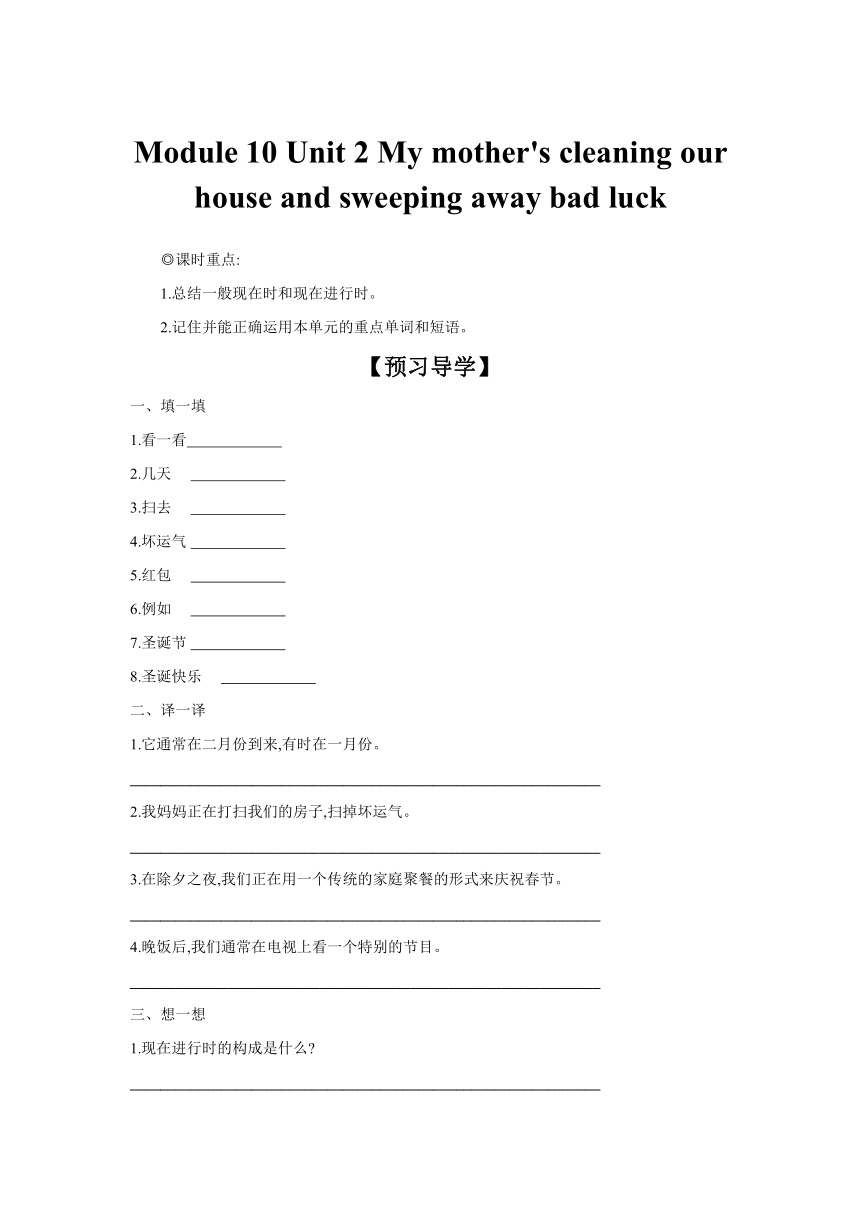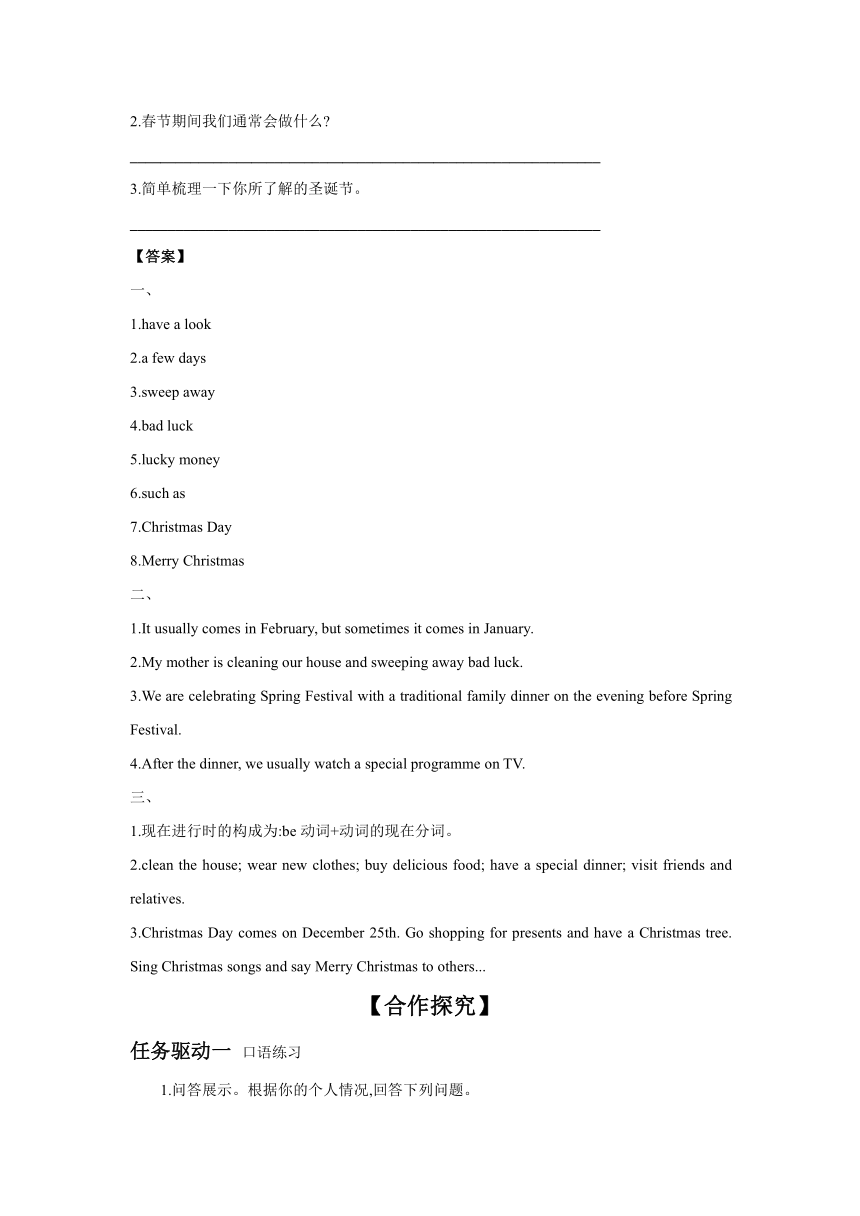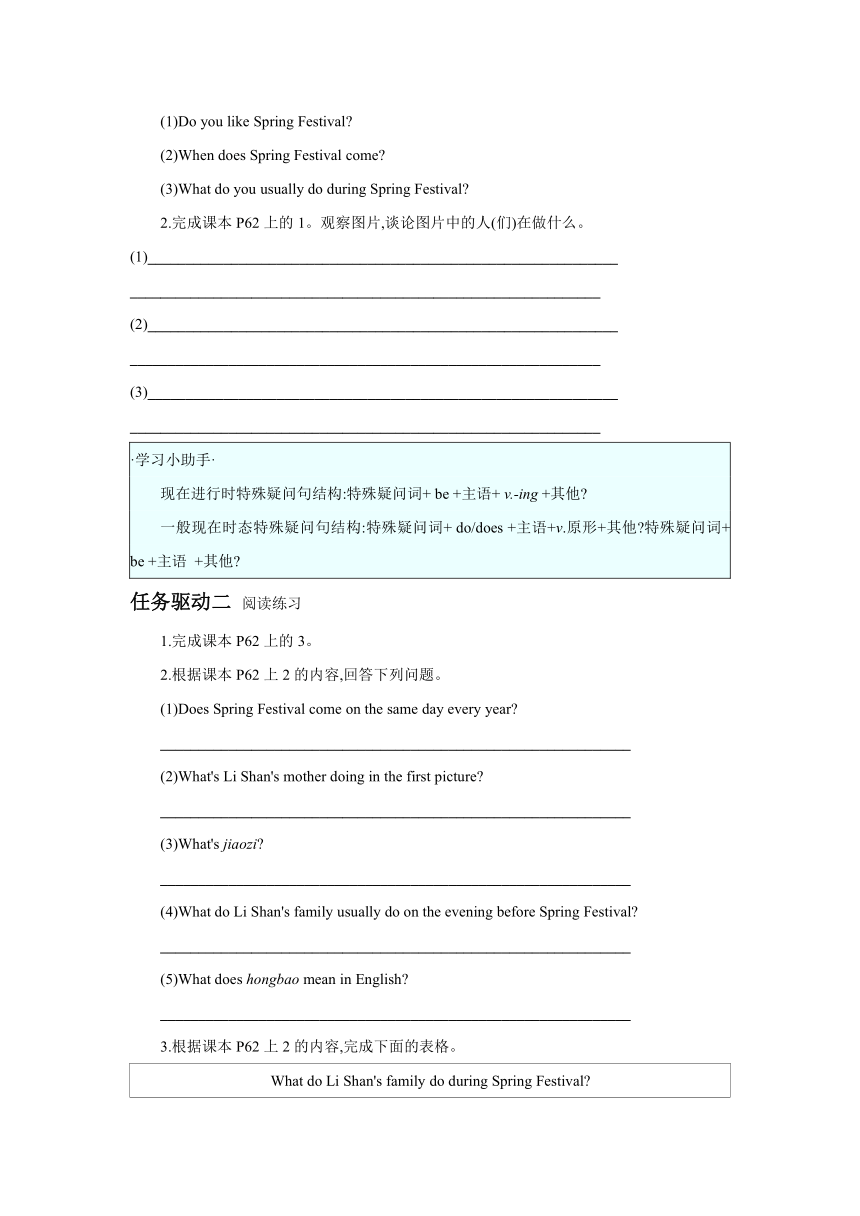Module 10 Unit 2 My mother's cleaning 学案 初中英语外研版七年级上册(含答案)
文档属性
| 名称 | Module 10 Unit 2 My mother's cleaning 学案 初中英语外研版七年级上册(含答案) |

|
|
| 格式 | docx | ||
| 文件大小 | 21.9KB | ||
| 资源类型 | 教案 | ||
| 版本资源 | 外研版 | ||
| 科目 | 英语 | ||
| 更新时间 | 2024-02-28 11:02:31 | ||
图片预览



文档简介
Module 10 Unit 2 My mother's cleaning our house and sweeping away bad luck
◎课时重点:
1.总结一般现在时和现在进行时。
2.记住并能正确运用本单元的重点单词和短语。
【预习导学】
一、填一填
1.看一看
2.几天
3.扫去
4.坏运气
5.红包
6.例如
7.圣诞节
8.圣诞快乐
二、译一译
1.它通常在二月份到来,有时在一月份。
______________________________________________________________
2.我妈妈正在打扫我们的房子,扫掉坏运气。
______________________________________________________________
3.在除夕之夜,我们正在用一个传统的家庭聚餐的形式来庆祝春节。
______________________________________________________________
4.晚饭后,我们通常在电视上看一个特别的节目。
______________________________________________________________
三、想一想
1.现在进行时的构成是什么
______________________________________________________________
2.春节期间我们通常会做什么
______________________________________________________________
3.简单梳理一下你所了解的圣诞节。
______________________________________________________________
【答案】
一、
1.have a look
2.a few days
3.sweep away
4.bad luck
5.lucky money
6.such as
7.Christmas Day
8.Merry Christmas
二、
1.It usually comes in February, but sometimes it comes in January.
2.My mother is cleaning our house and sweeping away bad luck.
3.We are celebrating Spring Festival with a traditional family dinner on the evening before Spring Festival.
4.After the dinner, we usually watch a special programme on TV.
三、
1.现在进行时的构成为:be动词+动词的现在分词。
2.clean the house; wear new clothes; buy delicious food; have a special dinner; visit friends and relatives.
3.Christmas Day comes on December 25th. Go shopping for presents and have a Christmas tree. Sing Christmas songs and say Merry Christmas to others...
【合作探究】
任务驱动一 口语练习
1.问答展示。根据你的个人情况,回答下列问题。
(1)Do you like Spring Festival
(2)When does Spring Festival come
(3)What do you usually do during Spring Festival
2.完成课本P62上的1。观察图片,谈论图片中的人(们)在做什么。
(1)______________________________________________________________
______________________________________________________________
(2)______________________________________________________________
______________________________________________________________
(3)______________________________________________________________
______________________________________________________________
·学习小助手·
现在进行时特殊疑问句结构:特殊疑问词+ be +主语+ v.-ing +其他
一般现在时态特殊疑问句结构:特殊疑问词+ do/does +主语+v.原形+其他 特殊疑问词+ be +主语 +其他
任务驱动二 阅读练习
1.完成课本P62上的3。
2.根据课本P62上2的内容,回答下列问题。
(1)Does Spring Festival come on the same day every year
______________________________________________________________
(2)What's Li Shan's mother doing in the first picture
______________________________________________________________
(3)What's jiaozi
______________________________________________________________
(4)What do Li Shan's family usually do on the evening before Spring Festival
______________________________________________________________
(5)What does hongbao mean in English
______________________________________________________________
3.根据课本P62上2的内容,完成下面的表格。
What do Li Shan's family do during Spring Festival
Before Spring Festival
On the evening before Spring Festival
On the first day of Spring Festival
4.完成课本P63上的3。
·学习小助手·
还记得一般现在时态的动词形式吗 动词用原形或者加-s,一般现在时句子变一般疑问句在句首加Do或Does,变否定句在主语之后、动词之前加don't 或doesn't,这四个助动词后都接动词原形。
任务驱动三 写作练习
根据活动二中的表格内容,写一篇介绍中国人如何过春节的短文。
______________________________________________________________
______________________________________________________________
______________________________________________________________
______________________________________________________________
·学习小助手·
and连接两个或两个以上谓语动词的时候,所有的谓语动词词形要统一。
【答案】
任务驱动一
2.(1)—What's Li Shan's mother doing
—She's cleaning the house.
(2)—What are Li Shan's family doing
—They are having a special dinner.
(3)—What are they doing
—They are visiting and greeting.
任务驱动二
2.(1)No, it doesn't.
(2)She is cleaning the house and sweeping away bad luck.
(3)A kind of dumpling.
(4)They celebrate Spring Festival with a traditional family dinner.
(5)Lucky money.
3.Clean the house and buy a lot of food. Celebrate Spring Festival with a traditional family dinner and watch a special programme on TV. Wear new sweaters and coats,visit uncles and aunts, and get lucky money.
任务驱动三
Spring Festival is very important in China.People usually clean the house and cook lots of food before Spring Festival. On the evening before Spring Festival, all the family usually get together and have a big dinner. People usually watch a special programme on TV.On the first day of Spring Festival, people usually get up early, put on their new clothes, visit each other and say “Happy New Year” to each other. Children usually get some lucky money from parents and grandparents.
【知识超市】
●It's a few days before Spring Festival. 这是春节前的几天。
1.a few 意为“一些;几个”;few意为“几乎没有”,表示否定意义。二者后接可数名词复数。a little意为“一点”;little意为“几乎没有”,表示否定意义。二者后接不可数名词。例如:
I have few/a few friends in this city.
这个城市里我几乎没有/有几个朋友。
There is little/a little water in the glass.
在玻璃杯里几乎没有/有一点水。
2.before意为“在……之前”,后接名词或动名词结构,其反义词为after。
[做一做]单项选择。
( )1.Mr Smith is quite busy today. He has meetings to attend.
A.little B.a little C.a few D.few
( )2.What do you usually do before to school
A.go B.goes C.going D.went
【答案】
1.C 2.C
●My mother is cleaning the house and sweeping away bad luck. 我妈妈正在打扫房子,扫掉坏运气。
sweep away 意为“扫掉;扫去”。例如:A strong wind sweeps away dead leaves. 疾风扫落叶。
[做一做]单项选择。
( )1.The students are the snow in the school yard.
A.sweep away B.put away C.sweeping away D.putting away
( )2.—I will take an important test tomorrow.
—Oh, really !
A.Good luck B.Very good C.I'm sorry D.Excuse me
【答案】
1.C 2.A
●We are celebrating Spring Festival with a traditional family dinner on the evening before Spring Festival.
在除夕之夜,我们正在用一个传统的家庭聚餐的形式来庆祝春节。
1.with 是介词,意为“用”。例如:He is writing to his friend with a pen. 他正在用钢笔给他的朋友写信。
2.in the evening 意为“在晚上”,表示泛指;on the evening before Spring Festival 意为“在除夕之夜”,表示特指。
[做一做]单项选择。
( )1.I see it my eyes.
A.in B.by C.with D.for
( )2. the afternoon of a cold winter, I met a friend on the road.
A.In B.On C.At D.To
【答案】
1.C 2.B
●I'm eating jiaozi—a kind of dumpling. After the dinner, we usually watch a special programme on TV. 我正在吃饺子——一种水饺。晚饭后,我们在电视上看一个特别的节目。
1.a kind of 意为“一种”;all kinds of 意为“各种各样的”; many kinds of 意为“许多种”。
2.on TV 意为“在电视上”。
[做一做]单项选择。
( )1.Eggplant (茄子) is a of vegetable.
A.kind B.list C.set D.lot
( )2.—What do you usually do on Sunday evening
—I usually watch a football match TV.
A.with B.in C.from D.on
【答案】
1.A 2.D
●It means lucky money. 它的意思是红包。
1.mean作动词,意为“意思是;意味着”,其名词形式为meaning。 例如:
What does it mean =What's the meaning of it 它的意思是什么
2.lucky money 意为“红包”;pocket money 意为“零花钱”。
[做一做]单项选择。
( )—What does it
—It baozi.
A.mean; mean B.means; mean C.means; means D.mean; means
【答案】
D
◎课时重点:
1.总结一般现在时和现在进行时。
2.记住并能正确运用本单元的重点单词和短语。
【预习导学】
一、填一填
1.看一看
2.几天
3.扫去
4.坏运气
5.红包
6.例如
7.圣诞节
8.圣诞快乐
二、译一译
1.它通常在二月份到来,有时在一月份。
______________________________________________________________
2.我妈妈正在打扫我们的房子,扫掉坏运气。
______________________________________________________________
3.在除夕之夜,我们正在用一个传统的家庭聚餐的形式来庆祝春节。
______________________________________________________________
4.晚饭后,我们通常在电视上看一个特别的节目。
______________________________________________________________
三、想一想
1.现在进行时的构成是什么
______________________________________________________________
2.春节期间我们通常会做什么
______________________________________________________________
3.简单梳理一下你所了解的圣诞节。
______________________________________________________________
【答案】
一、
1.have a look
2.a few days
3.sweep away
4.bad luck
5.lucky money
6.such as
7.Christmas Day
8.Merry Christmas
二、
1.It usually comes in February, but sometimes it comes in January.
2.My mother is cleaning our house and sweeping away bad luck.
3.We are celebrating Spring Festival with a traditional family dinner on the evening before Spring Festival.
4.After the dinner, we usually watch a special programme on TV.
三、
1.现在进行时的构成为:be动词+动词的现在分词。
2.clean the house; wear new clothes; buy delicious food; have a special dinner; visit friends and relatives.
3.Christmas Day comes on December 25th. Go shopping for presents and have a Christmas tree. Sing Christmas songs and say Merry Christmas to others...
【合作探究】
任务驱动一 口语练习
1.问答展示。根据你的个人情况,回答下列问题。
(1)Do you like Spring Festival
(2)When does Spring Festival come
(3)What do you usually do during Spring Festival
2.完成课本P62上的1。观察图片,谈论图片中的人(们)在做什么。
(1)______________________________________________________________
______________________________________________________________
(2)______________________________________________________________
______________________________________________________________
(3)______________________________________________________________
______________________________________________________________
·学习小助手·
现在进行时特殊疑问句结构:特殊疑问词+ be +主语+ v.-ing +其他
一般现在时态特殊疑问句结构:特殊疑问词+ do/does +主语+v.原形+其他 特殊疑问词+ be +主语 +其他
任务驱动二 阅读练习
1.完成课本P62上的3。
2.根据课本P62上2的内容,回答下列问题。
(1)Does Spring Festival come on the same day every year
______________________________________________________________
(2)What's Li Shan's mother doing in the first picture
______________________________________________________________
(3)What's jiaozi
______________________________________________________________
(4)What do Li Shan's family usually do on the evening before Spring Festival
______________________________________________________________
(5)What does hongbao mean in English
______________________________________________________________
3.根据课本P62上2的内容,完成下面的表格。
What do Li Shan's family do during Spring Festival
Before Spring Festival
On the evening before Spring Festival
On the first day of Spring Festival
4.完成课本P63上的3。
·学习小助手·
还记得一般现在时态的动词形式吗 动词用原形或者加-s,一般现在时句子变一般疑问句在句首加Do或Does,变否定句在主语之后、动词之前加don't 或doesn't,这四个助动词后都接动词原形。
任务驱动三 写作练习
根据活动二中的表格内容,写一篇介绍中国人如何过春节的短文。
______________________________________________________________
______________________________________________________________
______________________________________________________________
______________________________________________________________
·学习小助手·
and连接两个或两个以上谓语动词的时候,所有的谓语动词词形要统一。
【答案】
任务驱动一
2.(1)—What's Li Shan's mother doing
—She's cleaning the house.
(2)—What are Li Shan's family doing
—They are having a special dinner.
(3)—What are they doing
—They are visiting and greeting.
任务驱动二
2.(1)No, it doesn't.
(2)She is cleaning the house and sweeping away bad luck.
(3)A kind of dumpling.
(4)They celebrate Spring Festival with a traditional family dinner.
(5)Lucky money.
3.Clean the house and buy a lot of food. Celebrate Spring Festival with a traditional family dinner and watch a special programme on TV. Wear new sweaters and coats,visit uncles and aunts, and get lucky money.
任务驱动三
Spring Festival is very important in China.People usually clean the house and cook lots of food before Spring Festival. On the evening before Spring Festival, all the family usually get together and have a big dinner. People usually watch a special programme on TV.On the first day of Spring Festival, people usually get up early, put on their new clothes, visit each other and say “Happy New Year” to each other. Children usually get some lucky money from parents and grandparents.
【知识超市】
●It's a few days before Spring Festival. 这是春节前的几天。
1.a few 意为“一些;几个”;few意为“几乎没有”,表示否定意义。二者后接可数名词复数。a little意为“一点”;little意为“几乎没有”,表示否定意义。二者后接不可数名词。例如:
I have few/a few friends in this city.
这个城市里我几乎没有/有几个朋友。
There is little/a little water in the glass.
在玻璃杯里几乎没有/有一点水。
2.before意为“在……之前”,后接名词或动名词结构,其反义词为after。
[做一做]单项选择。
( )1.Mr Smith is quite busy today. He has meetings to attend.
A.little B.a little C.a few D.few
( )2.What do you usually do before to school
A.go B.goes C.going D.went
【答案】
1.C 2.C
●My mother is cleaning the house and sweeping away bad luck. 我妈妈正在打扫房子,扫掉坏运气。
sweep away 意为“扫掉;扫去”。例如:A strong wind sweeps away dead leaves. 疾风扫落叶。
[做一做]单项选择。
( )1.The students are the snow in the school yard.
A.sweep away B.put away C.sweeping away D.putting away
( )2.—I will take an important test tomorrow.
—Oh, really !
A.Good luck B.Very good C.I'm sorry D.Excuse me
【答案】
1.C 2.A
●We are celebrating Spring Festival with a traditional family dinner on the evening before Spring Festival.
在除夕之夜,我们正在用一个传统的家庭聚餐的形式来庆祝春节。
1.with 是介词,意为“用”。例如:He is writing to his friend with a pen. 他正在用钢笔给他的朋友写信。
2.in the evening 意为“在晚上”,表示泛指;on the evening before Spring Festival 意为“在除夕之夜”,表示特指。
[做一做]单项选择。
( )1.I see it my eyes.
A.in B.by C.with D.for
( )2. the afternoon of a cold winter, I met a friend on the road.
A.In B.On C.At D.To
【答案】
1.C 2.B
●I'm eating jiaozi—a kind of dumpling. After the dinner, we usually watch a special programme on TV. 我正在吃饺子——一种水饺。晚饭后,我们在电视上看一个特别的节目。
1.a kind of 意为“一种”;all kinds of 意为“各种各样的”; many kinds of 意为“许多种”。
2.on TV 意为“在电视上”。
[做一做]单项选择。
( )1.Eggplant (茄子) is a of vegetable.
A.kind B.list C.set D.lot
( )2.—What do you usually do on Sunday evening
—I usually watch a football match TV.
A.with B.in C.from D.on
【答案】
1.A 2.D
●It means lucky money. 它的意思是红包。
1.mean作动词,意为“意思是;意味着”,其名词形式为meaning。 例如:
What does it mean =What's the meaning of it 它的意思是什么
2.lucky money 意为“红包”;pocket money 意为“零花钱”。
[做一做]单项选择。
( )—What does it
—It baozi.
A.mean; mean B.means; mean C.means; means D.mean; means
【答案】
D
同课章节目录
- Starte
- Module 1 My teacher and my friends
- Module 2 My English lesson
- Module 3 My English book
- Module 4 My everyday life
- Module 1 My classmates
- Unit 1 Nice to meet you.
- Unit 2 I'm Wang Lingling and I'm thirteen years ol
- Unit 3 Language in use.
- Module 2 My family
- Unit 1 Is this your mum?
- Unit 2 These are my parents.
- Unit 3 Language in use.
- Module 3 My school
- Unit 1 There are thirty students in my class.
- Unit 2 The library is on the left of the playgroun
- Unit 3 Language in use.
- Module 4 Healthy food
- Unit 1 We've got lots of apples.
- Unit 2 Is your food and drink healthy?
- Unit 3 Language in use.
- Module 5 My school day
- Unit 1 I love history.
- Unit 2 We start work at nine o'clock.
- Unit 3 Language in use.
- Revision module A
- Module 6 A trip to the zoo
- Unit 1 Does it eat meat?
- Unit 2 The tiger lives in Asia.
- Unit 3 Language in use.
- Module 7 Computers
- Unit 1 How do I write my homework on the computer?
- Unit 2 When do you use a computer?
- Unit 3 Language in use.
- Module 8 Choosing presents
- Unit 1 I always like birthday parties.
- Unit 2 She often goes to concerts.
- Unit 3 Language in use.
- Module 9 People and places
- Unit 1 We're enjoying the school trip a lot.
- Unit 2 They're waiting for buses or trains.
- Unit 3 Language in use.
- Module 10 Spring Festival
- Unit 1 Are you getting ready for Spring Festival?
- Unit 2 My mother's cleaning our houses and sweepin
- Unit 3 Language in use.
- Revision module B
